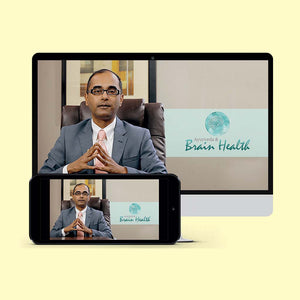
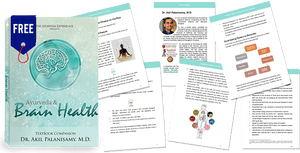
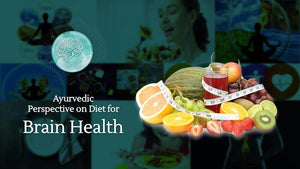
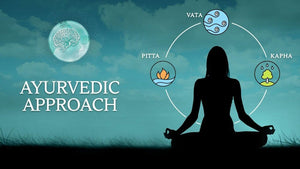
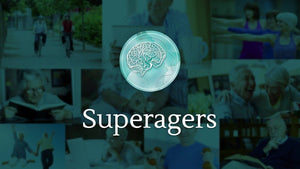

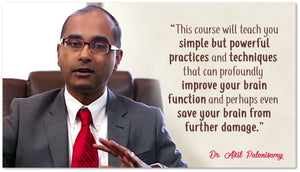
Ayurveda and Brain Health (Become a Superager, Keep Brain Healthy and Active with Ayurveda)
A course on how to become a “Super-Ager" and the Ayurvedic secrets for Mental Health and minimize the deterioration of the brain as you age!
About the Course
How to Become a “Super-Ager” and Keep the Memory and Attention of an Active 25-Year-Old Through Your 50s, 60s, 70s, 80s… and Beyond
"This course will teach you simple but powerful practices and techniques that can profoundly improve your brain function and perhaps even save your brain from further damage.”
Are you ready to be a superager?
Begin your journey on this path today!
Get instant digital access to the
entire course (which means you can watch the course online on your desktop, smartphone, or tablet!)
and a free e- text companion
After you complete watching the course, your Complimentary Course Completion Certificate awaits you. This can be easily downloaded and shared or printed.
60-day money back guarantee
About the Author
Dr. Akil Palanisamy, M.D.

Dr. Akil Palanisamy, a Harvard-trained physician practicing integrative medicine, combines Ayurveda and Western medicine in his clinical practice with patients in San Francisco.
After completing his undergraduate degree in biochemistry at Harvard, he performed clinical research at Harvard Medical School where he wrote his senior thesis. This was followed by medical school at the University of California, San Francisco, residency training at Stanford University, and fellowship in integrative medicine with Dr. Andrew Weil at the University of Arizona.
But that’s not it - what makes Dr. Akil unique is his in-depth study of the ancient Indian Science of Ayurveda which helps him take a holistic approach with his patients and show exceptional results of recovery and healing.
He studied Ayurveda in India at the Arya Vaidya Chikitsalayam in Coimbatore and completed clinical training with his guru Dr. L. Mahadevan in Derisanamcope, Tamil Nadu at the Sri Sarada Ayurvedic hospital.
As a Harvard trained MD, Dr. Akil integrates a strong scientific background in biochemistry and Western Medicine with training in Ayurveda and study of ancestral societies around the globe. This unique background enables him to seamlessly blend Ayurvedic principles with the latest research in nutrition, food science, and medicine. Dr. Akil is known to provide definitive, practical health information based on cutting-edge research and clinical experience.
Course Contents
Module 1: Superagers
- What are “superagers”?
- What brain scan research revealed about the difference between superagers and people of similar age
- The overlap between “cognitive” and “emotional” brain regions
- The relationship between the size of your cortex and your mental performance
- How do you become a superager?
Module 2: The Ayurvedic Approach
- The 3 Doshas and Prakruti
- The 7 Dhatus (vital tissues that provide nourishment, structure and growth to the human body
- The Srotas (the channels in the body)
- Subdoshas
- Samprapti: Ayurvedic Pathogenesis- A six-stage model that explains how disease develops
- Ayurvedic Psychology
- Khavaigunya: the defective space where Dementia and Alzheimer’s develop
- Dementia and Alzheimer’s
- Classical Treatments
Module 3: Integrative Medicine Approach to Brain Disorders
- Rise in Brain Disorders
- Contributing Factors to Dementia
- Chronic Inflammation
- Common Drugs that May Increase Risk of Dementia
- Solutions to Brain Dysfunction
- The Impact of Technology
- The MIND Diet
Module 4: Ayurvedic Perspective on Diet for Brain Health
- Ayurvedic Strategies to Strengthen Agni
- Diet and lifestyle guidelines
Module 5: Integrative Medicine Strategies for Optimal Brain Function
- Identify and Treat Depression
- Diagnose and Treat Chronic Infections
- Test for Food Sensitivities
- Balance Blood Sugar
- Optimize the Microbiome and Heal Leaky Gut Syndrome
- Leaky Gut – Leaky Brain
- Gut-Brain Axis
- Why Leaky Brain Matters
- My Top 5 Brain Foods
- Optimize Microbiome – Probiotics
- Sleep
- Exercise
- Intermittent Fasting
- The Role of Toxins in Brain Disease
- Detoxification
- Ayurvedic Detoxification
- The Effects of Chronic Stress on the Brain
- The Effects of Meditation on the Brain
- My Top 5 Ayurvedic Supplements for the Brain
- Challenge Your Brain
- Maintain a Positive Attitude
- Manage Your Emotions Well
- Gratitude and Forgiveness
- The Lesson of Placebos
- Spirituality
Module 6: Some Final Thoughts on Age
- Age is a Mental State
- As you age, you do not automatically have to lose brain function and develop dementia
- Age should not be used as an excuse for not feeling well
- In my practice, I do not accept the excuse “I must be getting old” as an explanation for any symptom








